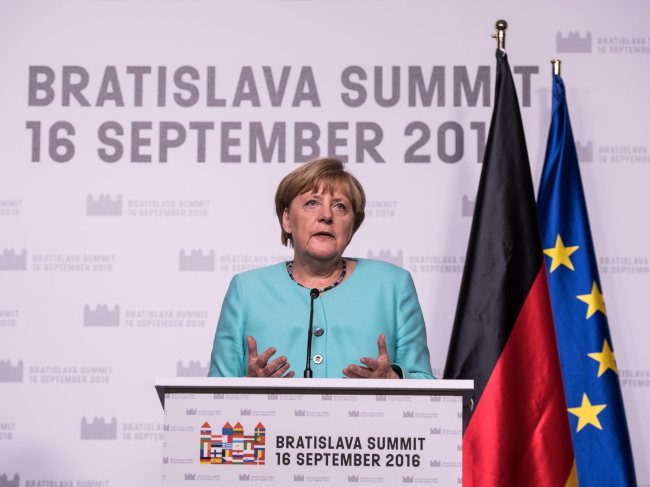BRATISLAVA -- European Union leaders agreed at a post-Brexit summit Friday to forge a new "vision" within six months to restore faith and unity in the bloc as it plans a future without Britain.
The 27 leaders meeting, without their British counterpart, in the Slovak capital Bratislava issued a roadmap to heal deep divisions and deal with the problems rocking the EU -- mass migration, security and a faltering economy.
In a show of unity after the summit in the hilltop Bratislava Castle, German Chancellor Angela Merkel and French President Francois Hollande pledged to make the plan agreed by their fellow leaders a success.
"We committed in Bratislava to offer to our citizens in the upcoming months a vision of an attractive EU they can trust and support. We are confident that we have the will and the capacity to achieve it," the 27 EU leaders said in a so-called Bratislava Declaration.
"The EU is not perfect but it is the best instrument we have for addressing the new challenges we are facing," it added.
The roadmap leads to a summit Rome next March to "round off the process launched in Bratislava", symbolically on the 60th anniversary of the bloc's founding treaty signed in the Italian capital.
- 'Sober but not defeatist' -
=============================
Key to the process will be cooperation between France and Germany, who form the traditional power axis of the EU despite their differences on key issues like the economy.
"Germany and France will very intensively play their part in the coming months in order to make all this a success," Merkel told a rare joint press conference with Hollande.

Merkel repeated her warning that the EU was in a "critical situation" -- although her influence as leader of the EU's biggest economy has been undermined by her unpopular decision to open Germany's doors last year to nearly a million refugees.
Hollande, who leads Europe's top military power now that Britain is on the way out, said "France and Germany will continue to work so that we can deliver concrete measures."
France and Germany produced a joint defence plan ahead of the summit and the unusual summit joint press conference clearly signalled they will take the lead in rebuilding confidence after Britain's shock June 23 referendum decision to quit.
EU President Donald Tusk, who chaired the meeting after touring capitals to find common ground, said the 27 had to focus "on the current situation in Europe, the fact that millions of Europeans feel insecure."
Former Polish premier Tusk said Friday's talks were "sober but not defeatist."
With security making the headlines and people traumatised by deadly terror attacks, leaders put the focus on boosting EU defence cooperation -- an issue Britain was lukewarm on at best as it feared it would undercut NATO.
European Commission head Jean-Claude Juncker submitted his own roadmap on Thursday, including controversial plans to approve an EU military headquarters and a combined military force by June 2017.
- 'All on the same boat'? -
===========================
Greeted by soldiers in bright blue uniforms and ceremonial plumes, the leaders held a first round of talks in towering Bratislava castle and then lunched on a river cruise aboard a German-flagged boat down the Danube to informally discuss Brexit.
Maltese Premier Joseph Muscat quipped in a tweet: "We are all on the same boat, literally."
All the EU leaders insisted there will be no formal Brexit talks until Britain triggers the two-year divorce process and says what it wants.
Tusk said he understood why Britain needs time to prepare, suggesting Prime Minister Theresa May could go for January or February, but the EU was ready and could even start the talks "tomorrow."
Despite the promise of one vision, cracks in the union are evident everywhere.
The migration crisis is the most divisive issue, with many Eastern European leaders including Slovakian Prime Minister Robert Fico, the summit's host, blaming Merkel for opening the continent's doors.
Tensions had bubbled up earlier this week when Luxembourg's foreign minister called for Hungary to be suspended from the EU for treating refugees other countries like "animals".
Europe is also divided on the economy. Thrice-bailed out Greece last week gathered mostly centre and centre-left southern EU leaders in Athens to urge their northern counterparts to share more of the migrant burden and ease up on austerity. (AFP)



![[Herald Interview] 'Amid aging population, Korea to invite more young professionals from overseas'](http://res.heraldm.com/phpwas/restmb_idxmake.php?idx=644&simg=/content/image/2024/04/24/20240424050844_0.jpg&u=20240424200058)














